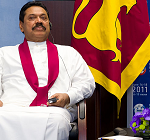At the recent UNHRC resolution calling for an international probe into alleged war crimes committed by the Sri Lankan government during the civil war with the LTTE, India decided to abstain. This came as a surprise, given that it had voted in its favour earlier.
The resolution was passed with the support of 23 nations, which shows that the international community is no longer prepared to accept Sri Lanka’s delaying tactics in attending to their concerns.
India has been reluctant to support the UNHRC vote against Lanka earlier as well, but has had to give in to domestic pressure from political parties in Tamil Nadu.
But this time, India had every reason to vote against, or at the very least, abstain. The Congress had nothing to lose, since the DMK – its time-tested ally in Tamil Nadu – had deserted the UPA coalition.
India justified its decision to abstain by stating that an intrusive approach would undermine Sri Lanka’s sovereignty and institutions.
However, Sri Lanka’s President Mahinda Rajapaksa, has repeatedly failed to honour promises made to implement the 13th Amendment to the Constitution, that would confer a level of autonomy to the Tamil population and kick-start the process of reconciliation.
The two earlier resolutions were aimed at giving adequate space and time to Sri Lanka to use its internal mechanisms to inquire into, and fix responsibility for, the alleged human rights violations and war crimes committed during the last stages of the war against the LTTE.
In response, Sri Lanka had set up the Lessons Learnt and Reconciliation Commission (LLRC), which had recommended investigating at least some of the more serious allegations against its army and the LTTE. However, these recommendations have not been implemented in a transparent manner, and President Rajapaksa has whipped up national passions, calling the resolutions an ‘international conspiracy’.
Sri Lanka’s argument that the UNHRC efforts are an intrusion into its national sovereignty has been supported by many countries, including China, Japan, India, Israel and Russia. India has also argued that any open-ended, country-specific mandate to monitor national processes for the protection of human rights, was not reflective of the process of dialogue and cooperation envisaged by the UN General Assembly Resolution 60/251, that created the Human Rights Council in 2006.
President Rajapaksa has very limited options available. He has rejected any possibility of an international investigation, saying that he was only concerned about the votes at home, and not at the UNHRC – a reference to the ruling coalition’s victory in two provincial council elections while the UNHRC was debating the resolution.
In a statement, he said that his party’s victory in the local elections was a fitting reply to anti-Sri Lankan elements, both local and overseas, and that no international force could undermine Sri Lanka’s progress. However, political rhetoric is not going to resolve Sri Lanka’s dilemma when it confronts the implementation phase of the resolution.
The resolution provides for two years before the implementation is discussed at the UNHRC. Within the first year, Sri Lanka and the Office of the Commissioner for Human Rights (OCHR) will have to reach a level of cooperation as the progress of the implementation will be reviewed at the end of the first year.
Cooperating with the OCHR will help restore Sri Lanka’s international credibility, but President Rajapaksa risks losing his support base if he gives in to international pressure. Among the Southern Sinhala population, he is regarded as the modern day Dutta Gemunu, the legendary Sinhala king who defeated the Tamil king Elara to form a united Sri Lanka.
The President has the option of rejecting the resolution, counting on China’s support at the UN to bail him out. But with China increasingly emphasising its role as a responsible international power, it may counsel him to cooperate with, rather than confront, the UN.
There is also the matter of India’s sensitivity to China’s growing influence in Sri Lanka. Contrary to popular perception, India continues to considerably influence Sri Lanka’s political, diplomatic and strategic perceptions. So President Rajapaksa will be cautious in how he plays the China card, as he needs India’s continued support. It is a Hobson’s choice for Sri Lanka as it will have to evolve a carefully worked out strategy, lest its decisions generate unpleasant consequences in the future.
Colonel R Hariharan, a retired military intelligence specialist on South Asia, served as the head of intelligence of the Indian Peace Keeping Force in Sri Lanka (1987-90). He is associated with the South Asia Analysis Group and the Chennai Centre for China Studies.
This blog was exclusively written for Gateway House: Indian Council on Global Relations. You can read more exclusive content here.
For interview requests with the author, or for permission to republish, please contact outreach@gatewayhouse.in.
© Copyright 2014 Gateway House: Indian Council on Global Relations. All rights reserved. Any unauthorized copying or reproduction is strictly prohibited


